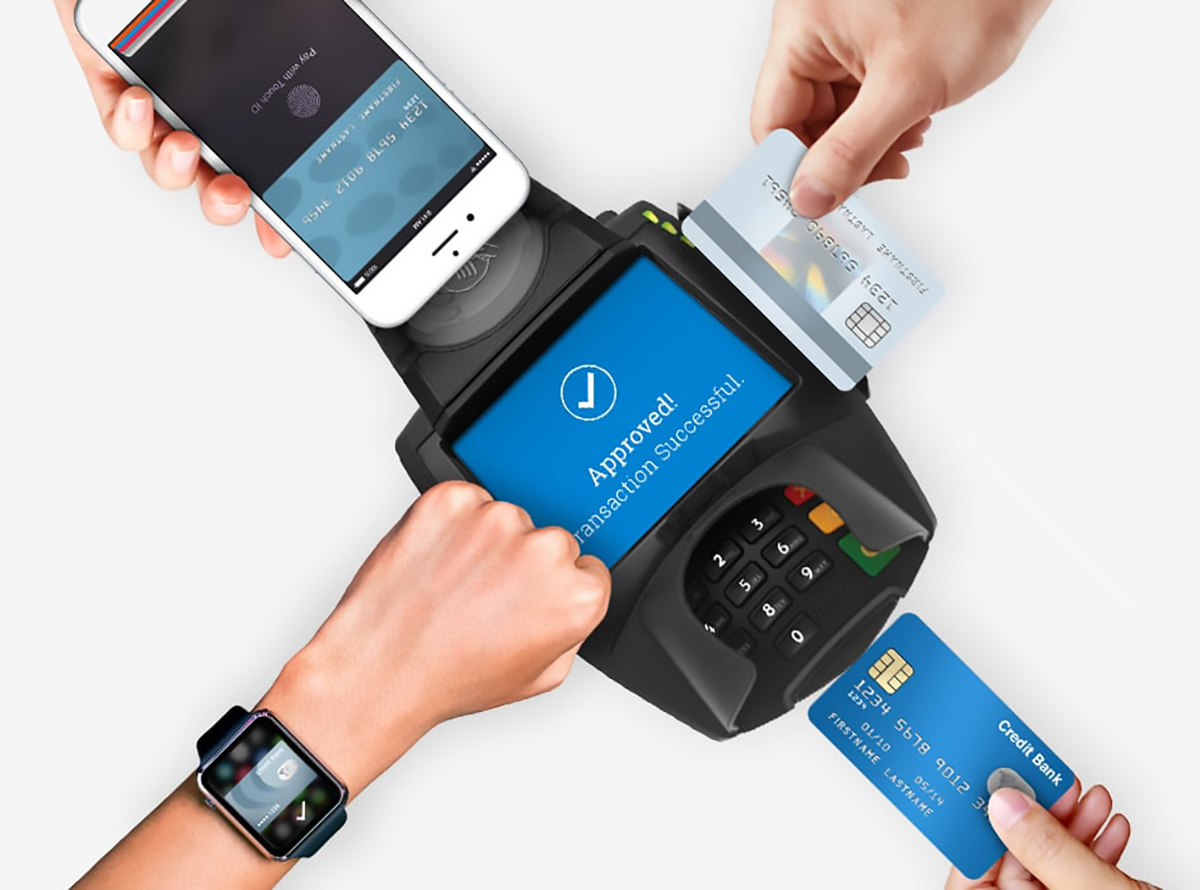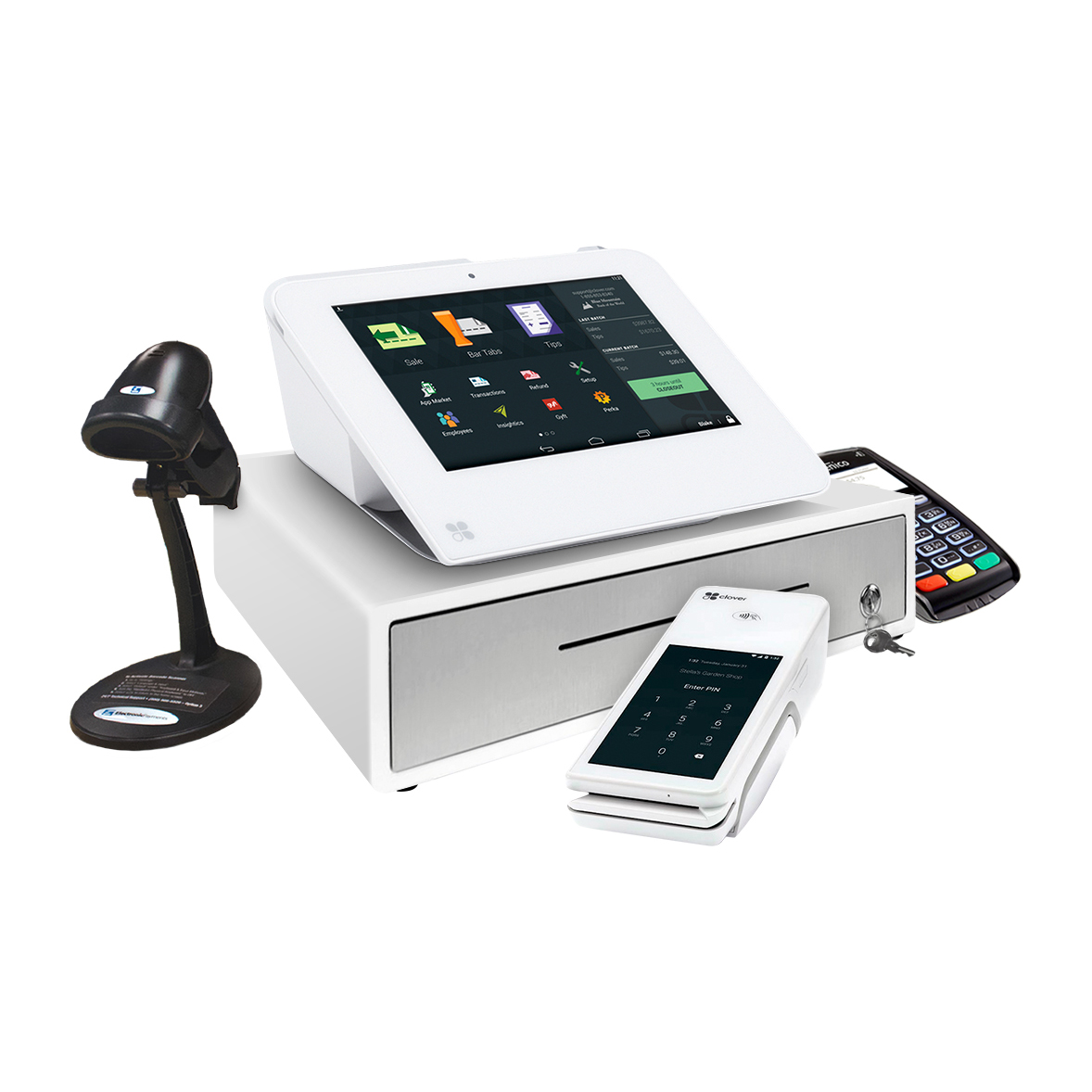Our cloud-based platform is so seamlessly integrated you would think it was part of your accounting software.





Streamlining Payments with QuickBooks Online Merchant Account
As a business owner who's navigated QuickBooks for over two decades, leveraging a QuickBooks Online Merchant Account has been one of the greatest efficiencies. By integrating credit card processing directly with QuickBooks Online, businesses can experience seamless transaction flows. This integration saves significant time by automatically syncing financial data and minimizing manual entry.
One compelling feature of the QuickBooks Online Merchant Account is its ability to lower processing fees. At The POS Brokers, we specialize in securing competitive rates for merchant accounts, ensuring you don't pay more than necessary. This means more money stays in your business, fueling growth and innovation. If you've ever been frustrated by high fees, this integration offers a practical solution.
In my experience, managing and automating invoicing through QuickBooks has transformed how we operate. Automated billing systems not only reduce errors but also improve cash flow management. With the QuickBooks Online Merchant Account, invoices can be customized, tracked, and reconciled effortlessly, allowing you to focus on strategic business goals rather than administrative tasks.
What Qualifies as a QuickBooks Online Merchant Account Emergency?
A QuickBooks Online Merchant Account emergency typically involves issues that halt transaction processing, leading to service disruptions.
Addressing these emergencies quickly is crucial to maintaining your business operations. Common problems might include transaction failures, login issues, or discrepancies in payment records. To prevent and solve such issues, ensure your account settings are periodically reviewed and updated. Staying vigilant helps mitigate sudden disruptions and keeps your operations running smoothly.
Steps to Set Up a QuickBooks Online Merchant Account
Setting up your QuickBooks Online Merchant Account is a straightforward process, ensuring you're ready to accept payments efficiently.
- Sign in to QuickBooks: Access your QuickBooks Online account, and navigate to the payments section.
- Select Setup Merchant Account: Follow the prompts to begin the setup process, entering necessary business details.
- Customize Your Payment Options: Choose your payment processing preferences and select appropriate fee structures.
- Integrate with Invoicing: Link your merchant account directly to your invoicing system for seamless transaction logging.
- Test Transactions: Run test payments to ensure everything is integrated correctly before going live.
These steps facilitate a smooth setup, allowing you to take advantage of streamlined payment processing that a QuickBooks Online Merchant Account provides.
Benefits of Using a QuickBooks Online Merchant Account
The QuickBooks Online Merchant Account offers several advantages beyond just processing payments. One of the standout features is the real-time reconciliation. By automatically matching payments with invoices, it saves considerable time and reduces errors. For a business owner, this clarity in financials is invaluable.
Another benefit is the enhanced payment security. With PCI compliance integrated, your transactions are safeguarded against potential threats. This bolstered security builds trust with your clients, reassuring them that their payment data is handled with the utmost care.
The integration also supports multiple payment types--credit cards, debit cards, and ACH transactions--catering to diverse client needs. This flexibility is especially beneficial for businesses looking to expand their customer base.
- Seamless Integration: Benefit from a unified system that integrates financial records with ease.
- Cost Efficiency: Lower processing fees allow for better resource allocation.
- Automation: Reduce manual input while increasing accuracy in financial records.
Common Issues and Solutions with QuickBooks Online Merchant Account
Despite its benefits, users might encounter certain challenges with their QuickBooks Online Merchant Account. A frequent issue is transaction delays, often caused by incorrect account settings or network interruptions. Regularly updating software and ensuring stable internet connectivity can alleviate these problems.
Another common challenge is discrepancies in account balances. To handle this, it's essential to perform regular reconciliations and cross-check statements against transaction logs. Utilizing QuickBooks' reporting features can provide insights and help identify anomalies effectively.
By understanding these potential pitfalls and employing proactive strategies, the efficacy of your QuickBooks Online Merchant Account can be elevated, ensuring your business benefits from all that seamless integration has to offer.

The Role of QuickBooks Merchant Account in Modern Business
The evolution of financial management has seen the quickbooks merchant account play a pivotal role in contemporary business environments. As an integral part of QuickBooks, this service simplifies payment processes, enabling businesses to focus on growth. I've spent over two decades helping businesses leverage QuickBooks, and the advent of the merchant account has significantly enhanced operational efficiency.
How Does QuickBooks Merchant Account Enhance Security and Efficiency?
A quickbooks merchant account not only facilitates seamless transactions but also ensures security through robust PCI compliance. As a professional in this field, I have seen firsthand how secure payment gateways bolster client trust. This security measure is more than just a standard; it's a requisite for maintaining the integrity of transactions.
Efficiency is another hallmark of the quickbooks merchant account. By integrating payment systems, it allows real-time reconciliation, which is crucial for accurate financial records. This capability reduces manual errors, a common issue in financial management, thereby saving businesses both time and resources.
- Instant payment processing
- PCI compliance for enhanced security
- Integrated reconciliation features
Steps to Set Up Your QuickBooks Merchant Account
Establishing a quickbooks merchant account is both straightforward and rewarding. Here's a step-by-step guide:
- Log into your QuickBooks account.
- Navigate to the 'Sales' or 'Invoicing' tab.
- Select 'Merchant Services' from the dropdown and follow the prompts.
- Complete the application and await approval.
- Upon approval, start integrating payment functionalities with your current setup.
Following these steps ensures a timely setup, allowing your business to harness the power of seamless payment processing immediately.
What Are the Common Concerns About QuickBooks Merchant Account?
Many business owners often express concerns about the cost implications of a quickbooks merchant account. The reality is these costs are variable, influenced by transaction volume and specific business needs. In my experience, negotiating terms tailored to business size often results in favorable outcomes.
Another point of hesitation is the complexity perceived in its setup. Yet, the user-friendly interface of QuickBooks offers a guided setup process, demystifying what many assume to be technical complexities. Additionally, the support from QuickBooks itself ensures that assistance is just a call away.
Leveraging QuickBooks Merchant Account for Business Growth
For any business aiming for expansion, the quickbooks merchant account is a strategic asset. By automating invoicing and integrating advanced financial tools, businesses can streamline operations significantly.
The ability to accept diverse payment methods--something I emphasize to my clients--broadens market reach. A quickbooks merchant account harmonizes these methods, making it a cornerstone for scalable business solutions. My own clients have reported reduced operational burden and improved financial clarity due to these integrations.
The impact of a quickbooks merchant account extends beyond traditional bookkeeping, facilitating an ecosystem where financial stability and growth go hand in hand.
What Are the Benefits of a QuickBooks Payment Merchant Account?
A QuickBooks payment merchant account offers myriad advantages designed to streamline business operations and boost efficiency. One primary benefit is the seamless integration with QuickBooks software, enabling real-time synchronization of transactions. This integration minimizes the risk of data entry errors and saves significant time. Moreover, accepting a variety of payments, from credit cards to ACH transfers, empowers businesses to cater to diverse customer preferences.
Beyond these operational benefits, a QuickBooks payment merchant account is also designed to offer competitive rates. By leveraging the platform's features, businesses can potentially lower processing fees, optimizing cash flow. For those seeking to maximize cost efficiency, options such as Level 2/3 interchange optimization can deliver substantial savings, especially for B2B transactions.
Cost-Saving Strategies for QuickBooks Payment Merchant Accounts
As a financial professional with over 20 years of experience, ensuring cost efficiency in QuickBooks payment merchant accounts is crucial. One effective method is to negotiate for cash discount options. This approach allows merchants to pass processing fees to customers who choose card payments, ultimately reducing fees on your end.
Additionally, leveraging Level 2/3 processing can further lower costs for businesses handling frequent B2B transactions. This strategy requires enhanced transaction data but offers considerable interchange rate savings. For high-volume enterprises, exploring custom pricing plans can result in dramatically reduced transaction costs, tailored to your specific needs.
Automated invoicing also plays a key role in reducing costs. By automatically tracking payments and reconciling accounts, businesses can cut down on time spent on manual data entry, thus lowering labor costs.
Addressing Common Concerns About QuickBooks Payment Merchant Accounts
One frequent concern surrounding QuickBooks payment merchant accounts is security. QuickBooks addresses this with robust PCI compliance, ensuring sensitive transaction data is processed securely. This compliance is critical for maintaining customer trust and avoiding potential liabilities.
Another common issue relates to the seamless integration of QuickBooks merchant services with existing systems. Although integration is typically smooth, there may be initial setup challenges. To mitigate this, QuickBooks offers extensive support and resources to facilitate a smooth transition, including customer service and online troubleshooting guides.
For businesses unsure about fluctuating transaction fees, QuickBooks offers transparent pricing plans, allowing enterprises to better predict costs and align them with their financial strategies. Tailored support ensures that businesses have the guidance needed to optimize their payment solutions effectively.
- PCI compliance ensures secure transactions
- Comprehensive support for integration challenges
- Transparent pricing to avoid unexpected fees
How Do You Set Up a QuickBooks Payment Merchant Account?
Setting up a QuickBooks payment merchant account involves several straightforward steps to get your business ready to handle various payment types:
- Begin by logging into your existing QuickBooks account and navigating to 'Sales'.
- Select 'Merchant Services' and follow the prompts to initiate a new setup.
- Enter your business and banking details to configure the account to your requirements.
- Review your chosen pricing plan and ensure it aligns with your business goals.
- Finally, test the integration with QuickBooks to confirm transactions are syncing correctly.
With this setup, a QuickBooks payment merchant account allows you to efficiently manage transactions and streamline your financial operations.

How Does QuickBooks Online Merchant Account Streamline Payment Processing?
QuickBooks Online Merchant Account offers a seamless integration with your existing QuickBooks setup, allowing you to process payments directly within the platform. This integration minimizes manual data entry by automatically syncing transaction information, saving you precious time. One of my clients, for example, found that their monthly reconciliation process was reduced from several hours to just minutes. This operational efficiency means you can focus more on strategic business activities rather than administrative tasks. Have you experienced any time-consuming processes that could benefit from automation?
What Qualifies as a QuickBooks Online Merchant Account Emergency and How Can You Tackle It?
Emergencies with QuickBooks Online Merchant Accounts often involve transaction stoppages or service interruptions. Imagine running a promotion, and suddenly, your payment processing grinds to a halt; this can be a nightmare. To address such issues, it's crucial to regularly review your account settings and keep your software up-to-date. By doing so, you're less likely to encounter these emergencies. If your account does face an emergency, having a reliable support contact, like our team at The POS Brokers, can be invaluable. Have you considered creating a checklist to perform regular maintenance on your payment setup?
What Are the Steps to Set Up a QuickBooks Online Merchant Account?
Setting up your QuickBooks Online Merchant Account is straightforward. First, sign in to QuickBooks and navigate to the payments section. From there, select "Setup Merchant Account" and follow the prompts, entering necessary business details. Customize your payment options and integrate them with your invoicing system. Testing transactions is crucial to ensure everything is working correctly. I often tell clients, "Think of this process like setting up a new phone: simple, but crucial to do right to avoid future hiccups." Could an intuitive setup checklist help streamline your onboarding process?
What Are the Benefits of Using a QuickBooks Online Merchant Account?
The benefits of a QuickBooks Online Merchant Account extend beyond payment processing. It provides real-time reconciliation, reducing errors and saving time. For instance, a friend who runs a retail business saw a 20% reduction in accounting errors. Enhanced payment security through PCI compliance is another benefit, instilling trust among clients. Additionally, it supports diverse payment types, broadening your customer base. This flexibility is akin to offering free shipping in e-commerce--it's an added incentive for customers. What additional features would make your current setup more efficient?
What Are Common Issues with QuickBooks Online Merchant Account and How Can They Be Solved?
Common issues include transaction delays and discrepancies in account balances. These can often be resolved by ensuring stable internet connectivity and performing regular software updates. Regular reconciliations can prevent discrepancies; I like to think of them as a financial "check-up." Utilizing QuickBooks' reporting features can help identify and resolve anomalies effectively. Imagine catching an error before it cascades into a larger problem - proactive analysis can save significant headaches. What strategies do you use to maintain accuracy in your financial operations?
How Does a QuickBooks Merchant Account Enhance Security and Efficiency?
Security and efficiency are prime benefits of a QuickBooks Merchant Account. With PCI compliance integrated, your transactions are safeguarded against threats. This is not just a feature but a necessity to maintain trust. Similarly, real-time reconciliation ensures that your financial records are accurate, minimizing manual errors. It's like having a security system for your finances, offering peace of mind. Reflect on your current system--how could it be more secure or efficient?
What Are the Common Concerns About QuickBooks Merchant Account?
Many businesses worry about costs and setup complexity. However, by negotiating terms based on your transaction volume and business needs, costs can be optimized. The intuitive setup process within QuickBooks also demystifies potential tech challenges. Think of it like setting up a new app on your phone--guidelines are clear and supportive. How important is cost predictability in your financial planning?
What Are Some Cost-Saving Strategies for QuickBooks Payment Merchant Accounts?
Negotiating cash discount options is a practical strategy, allowing fees to be shifted to customers using card payments. Additionally, Level 2/3 processing can offer substantial savings for B2B transactions, which can be a game-changer for high-volume businesses. Think of it like bulk buying--spending a bit more effort upfront yields long-term savings. How do you evaluate cost-saving measures in your business?
How to Navigate QuickBooks Merchant Services Effectively?
Accessing the QuickBooks Merchant Service Center grants control over transactions and settings. By logging into QuickBooks and selecting 'Merchant Services', you can manage fees and generate reports. It's like having a virtual dashboard for all your financial operations. Tutorials and troubleshooting guides are available if needed, ensuring smooth sailing. How do you currently manage your payment services, and where could it improve?
How Do You Set Up a QuickBooks Payment Merchant Account?
Setting up a QuickBooks Payment Merchant Account involves logging into QuickBooks, choosing 'Merchant Services', and following setup prompts. Enter your business and banking details and review your pricing plan. Testing the integration ensures everything is robust before going live. Picture setting up a seamless new business process--taking the time to do it right pays off in operational efficiency. How often do you reassess your financial systems to enhance business operations?
Resources
- Small Business Administration - The Small Business Administration website offers resources and guidance for small businesses looking to streamline their payment processes.
- U.S. Department of Education - The U.S. Department of Education provides information on financial management and resources for businesses of all sizes.
- Federal Reserve - The Federal Reserve website offers insights into payment systems and financial services for businesses.
- U.S. Securities and Exchange Commission - The SEC website provides information on regulations and compliance related to financial transactions.
- USA.gov - USA.gov is a comprehensive resource for business owners looking for information on financial management and payment processing.
Contactless Payments!
Ensure your safety with the convenience of contactless payments. Our wide range of devices offers seamless contactless payment options, along with mobile contactless alternatives for hassle-free curbside pickups and deliveries. Contact us today for further details and stay secure.
Chip Card
Swipe Card
Apple Watch
E-Check
NFC Phone
 Quick Tip
Quick Tip
38% of new business owners make the wrong choice when selecting a POS for their startup.
Let Us Help You Choose the Right POS System and Save You the Hassle!

Contactless Payments!
Stay safe with contactless payments. All of our devices have contactless payment options and mobile contactless options for curbside pickups and deliveries. Call now for more information.
Chip Card
Swipe Card
Apple Watch
E-Check
NFC Phone
Ready to talk to an advisor?
Complete the form or call us now to talk to a live representative.
“The POS Brokers are amazing. They answered all our questions and explained everything clearly.”
Retail Owner






Reviews
There are no reviews yet.